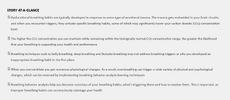I came across this on Twitter (X) when Erin Elizabeth of Health Nut News (Mercola's ex, if I'm not mistaken) posted that she's praying for Mercola and his family right now. I thought maybe it was a health emergency, but she linked to an article that seems much more bizarre. Apparently Mercola has been consulting with a psychic/channeler who has been advising him on both spiritual matters and on his business. Mercola has fired 3 or 4 of his top executives in his company, one of whom is his sister, and is now diverting the efforts of his company to publish a book based on these channelings.
Here's the article, quoted below:

 www.naturalproductsinsider.com
www.naturalproductsinsider.com
From the outside, it looks like Joseph Mercola is the victim of a new-age con and his entire business is threatened as a result, but obviously more information is needed. Mercola has always appeared to be a thorn in the side of the Official Narrative™, so maybe they finally found a way to silence him?
Here's the article, quoted below:

Anti-vax doctor consulted psychic before firing executives at Mercola
Discover the shocking termination of top Mercola executives amid controversy over Dr. Joseph Mercola's consultation with a psychic before making the shakeup. What's next for the dietary supplements brand?
Dr. Mercola consulted with psychic before axing top executives
The CEO of Mercola and two other brand executives were terminated without warning last week, and video evidence suggests founder Dr. Joseph Mercola consulted with a psychic before making the move.
Top executives at Mercola, the brand founded by controversial figure Dr. Joseph Mercola, were terminated last week without notice, and evidence has surfaced that the doctor is taking direction from a man who claims to channel the voice of an “ancient and wise high-vibration entity from the causal plane.”
An email that appears to be written by Mercola and shared with a reporter for this story also includes language suggesting the firings were related to the executives’ religious beliefs. Mercola did not respond to repeated requests for comment.
Mercola products are sold online and in major retail chains, and the brand boasts an outsized presence in social media driven by Mercola’s outspoken views on health and medicine.
In hours of video discovered online, Mercola converses with a man going by the name Kai Clay who speaks as though he is the voice of the entity, referred to as “Bahlon.” Clay, with his eyes closed as if in trance, talks with Mercola about his business and spiritual matters in a rambling conversation that the doctor claims will be the basis of a series of books he plans to publish. In a video of Mercola that was shared with the brand’s employees Feb. 12, the doctor described a 12-book series as “a new beginning for the company” and declared that “my new goal is to reach billions, literally billions, around the world with a new paradigm of how to increase joy in their life.”
The Feb. 12 video came five days after three top executives — CEO Steve Rye; Chief Business Officer Ryan Boland; and Chief Editor Janet Selvig, Mercola’s sister — received termination letters signed by a Laura Berry, who had not worked at the company before but claimed in the letter she was the new Mercola CEO. In the Feb. 12 video, Mercola announced he will visit the offices on Feb. 14 with “my new CEO who's a brilliant, unbelievable woman who's going to take us to the next level,” but offers no name. He also promises a “surprise guest” who will be the company’s chief operating officer.
Mercola’s brand has found success online and in brick and mortar, including the massive Kroger chain — much of the appeal built on a deep social media presence with the doctor claiming 2 million followers. NHP Innovations LLC, the corporation behind the Mercola brand, employs 150 people in its Florida offices and contracts with dozens of co-manufacturers to produce more than 1,400 products. The brand has been praised for high quality and rigorous supply chain standards.
As a public figure, Mercola has attracted no shortage of controversy, with critics taking particular issue with his views on Covid vaccinations. Mercola was included in “The Disinformation Dozen” by the Center for Countering Digital Hate and The New York Times in 2021 labeled him “the most influential spreader of coronavirus misinformation online.” Mercola was banned from YouTube for his anti-vaccine views. He has 1.7 million followers on Facebook and 415,000 followers on Twitter.
Troubling signs
In a Feb. 10 telephone interview, Selvig described the situation with her brother as evolving after she began noticing odd language in his emails in late 2023. She later learned Mercola had been consulting with Kai Clay as Bahlon for several months. Clay and the doctor were both advertised as speakers at an event on Nov. 19, 2023, at Sacred Space Miami. Clay is described as a “Master Trance Channel” on bahlon.com, where he offers readings. An affiliate program described on the site promises payment to followers who bring him more reading clients. Promotional postings on other sites claim he has worked with celebrities and “helps CEOs and entrepreneurs create competitive business strategies,” but no names are shared.
Selvig said she confronted her brother about the odd behavior on Jan. 31 after seeing hours of videos of his trance channeling sessions with Bahlon. “I just felt immediately that he was being taken advantage of,” Selvig said.
The confrontation did not go well. Selvig said her brother was very dismissive of her concerns and defended his work with Clay. “He thinks the book is going to save the world,” Selvig said. “He believes that he's [Mercola] a god and he's been reincarnated. And he even referred to himself as the new Jesus.”
On Feb. 2, Selvig was shown an email sent to a coworker from Mercola’s address announcing the doctor’s intention to fire Selvig, Rye, Boland and a fourth executive. The email offered the CEO spot to a different Mercola team member who later turned down the position. The email went on to explain “reasons for the mutiny,” describing the Catholic church as a “global cabal” that controls “50% of the world’s worth” and “created all the pain that most people experience.”
The email added that Rye, Boland, Selvig and the fourth executive have “strong commitments to the Catholic church.” “The group I am now working with is committed to liberating their wealth and control back to the people and give them back their freedom. I hope you will join me in this noble anti crusade against them,” the email reads.
The termination letters came five days later, sent to Selvig, Rye and Boland minutes apart in the evening of Feb. 7 and declaring their dismissals “effective immediately.” Signed Laura Berry, the termination letters state Selvig, Rye and Boland would not be allowed on Mercola property and their belongings would be shipped to them.
Reached Feb. 12, Boland said his termination came as a complete surprise. He had not been made aware of Mercola’s involvement with Clay and Bahlon. “No one told me anything. I just got a letter one day [that] I'm gone.” Boland said he is worried about the people still working at the company and can’t understand why he was fired four months short of his 10-year anniversary with the business. “You put this much into something and then you don't have it, in a day, for no reason.”
Selvig said she is also worried about what’s next for the company. “I've worked with my brother for almost 40 years,” she said. Among her concerns are that Clay is working with others to seize control of the brand Mercola built.
Outsider element
Information on the new CEO, Laura Berry, has not been provided. A reporter for this story reached out via email to the address used in the termination letter, but it has not resulted in a reply. A voice message left at a phone number thought to belong to Berry was not returned. Messages and calls to email addresses, phone numbers and a LinkedIn profile associated with Clay were also not returned.
Information about Kai Clay is easier to find, but his actual identity is not clear. LinkedIn profiles for Clay and a Christopher Johnson share photos of the same man that appear to have been taken at the same time. The photos match the man identified as Clay at bahlon.com.
The Christopher Johnson profile includes claims of employment with “Whitehorn” dating to 2005. A website for Whitehorn Group describes “Chris’s approach to value creation” but offers little information and does not list a full name. Two people listed as Johnson connections on LinkedIn say they don’t know who he is. In the profile, Johnson claims to have been appointed to the U.S.-Afghan Women’s Council and describes the organization as being formed by Hillary Clinton, Laura Bush and Rula Ghani, the former first lady of Afghanistan. On her LinkedIn profile, a woman thought to be new Mercola CEO Laura Berry also claims to be on the U.S.-Afghan Women’s Council, but she describes it as established by former President George W. Bush and Afghan President Hamid Karzai. The council web page does not reference Johnson or Berry.
Natural Products Insider reached out to the U.S.-Afghan Women’s Council and Georgetown University where the council is based, but neither group immediately responded to emails regarding the council's association with Johnson and Berry.
The LinkedIn profile for Kai Clay declares he has been the owner of “Spiritual Mind” since 1999 and lists no other employment. Skills noted on the profile include “Spiritual Coaching” and “Spiritual Gifts.”
Promotional information on bahlon.com appears misleading. A headline on the site refers to LA Weekly labeling Bahlon as “the psychic’s psychic,” but a Google search turns up what appears to be a promotional piece on laweekly.com and not an article from the publication. Descriptions of Bahlon and the psychic services on other written sites appear similarly promotional.
The entity speaks
What is clear is that Kai Clay/Chistopher Johnson has cultivated a deep relationship with Mercola. In hours of conversation, Clay advises Mercola on spiritual matters and also discusses the Mercola business. Between quasi-spiritual language like “all you're doing is returning to that which is you in the first place,” Clay talks to him about new enterprises and efforts Mercola could launch.
In the video sent to employees Feb. 12, Mercola spoke of a “new business partner” in Miami and referred to elaborate and ambitious plans, announcing, “We’re in the process of creating medical clinics over the entire country that's going to change the whole system.”
Selvig said she is worried Mercola is being isolated and manipulated. When she spoke to him after she saw the Feb. 2 letter discussing her termination and denouncing Catholicism, he dismissed her concerns. “He said, ‘Well, I could see how you would think that, but I'm fine. And I'm going to save the world with this. I don't know what's taking you so long to get on board and edit [the book]. I hear your concerns, but I am not going to debate you.’”
According to Selvig, Mercola exhorted her to “join this noble crusade.”
She did not sign on.
“I said, ‘I love you,’” she recalled. “And that was the end of that call.”
Ripple effects
The impact of the upheaval beyond the Mercola supplement brand is difficult to predict. Yadim Medore, whose Pure Branding agency works with brands to understand and influence public perception, said the disruption at Mercola will ignite “a big media storm,” but there will likely be no effect on public trust in dietary supplements. Fringe beliefs abound in the industry and most consumers look past it, he suggested. “There's always been kind of these elements in the industry, and we know that people still have great trust and love for the industry,” Medore said.
It is unclear if Mercola’s followers will be troubled by news of his consultations with Clay and Bahlon, Medore added. Mercola has made persecution from mainstream medicine and media part of his narrative, and some followers will see criticism related to the Bahlon matters as further evidence of that persecution. “His followers are passionate,” Medore said.
After the mainstream media moves on from the story, the chatter may persist only in the supplement industry. “Certainly, all of us in the industry will wring our hands a bit,” Medore noted.
Organizations directly impacted by the shake-up at Mercola include the Organic & Natural Health Association, which counts Mercola’s company as a sponsor. Executive Director Karen Howard called the situation “a tragedy.” In a statement, she wrote that “Dr. Mercola, with a truly amazing management team, created a supply chain that currently stands as an industry bellwether. It is a supply chain that serves as a catalyst for growth in the regenerative and organic marketplace, and the participating companies are deeply committed to the health of the planet and its people.”
Howard’s organization, she said in the statement, stands by the principles the brand had embodied. “We have benefitted greatly from the leadership and quality standards of Dr. Mercola’s company. We will always be a champion for all of our remarkable member companies who adhere to our tenets. Our hearts go out to Dr. Mercola, his family, and our friends and colleagues who find themselves adversely impacted by the changes at hand.”
From the outside, it looks like Joseph Mercola is the victim of a new-age con and his entire business is threatened as a result, but obviously more information is needed. Mercola has always appeared to be a thorn in the side of the Official Narrative™, so maybe they finally found a way to silence him?


